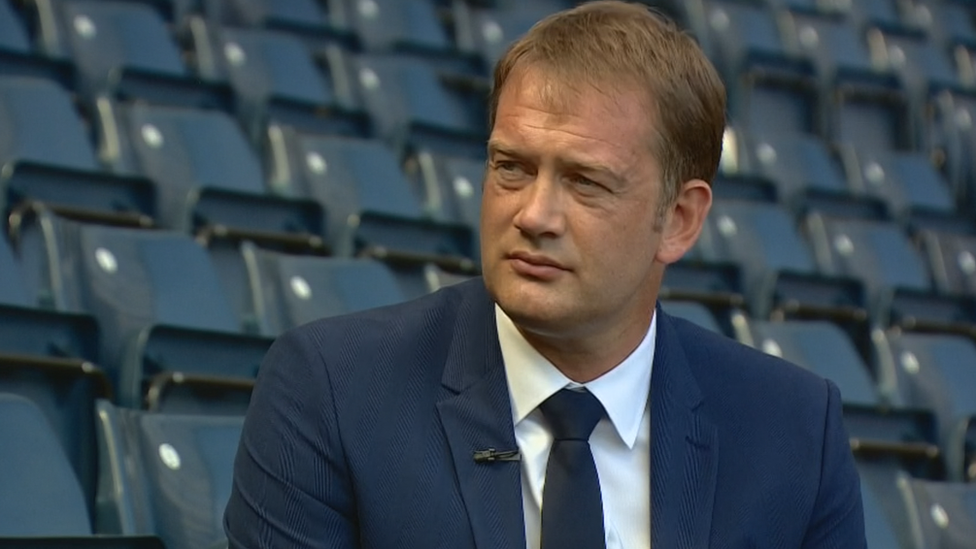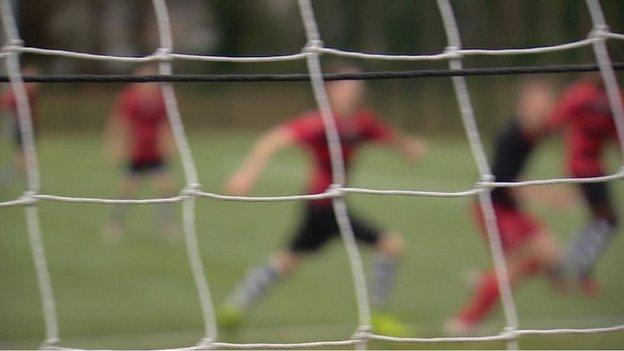SFA issues apology to victims of historical child abuse
- Published

Ian Maxwell, the SFA's chief executive, has apologised
The chief executive of the Scottish FA has apologised for the "abhorrent" abuse suffered by young people under its care in the past.
But Ian Maxwell said Scottish football was "a safe place for children".
He was responding to the interim findings of a review set up 18 months ago following allegations of historical abuse spanning decades.
It found child protection policies are "not fit for purpose" and must change to prevent future cases of abuse.
The head of the sport's governing body said the report's recommendations would be implemented where possible.

Mr Maxwell said: "I would like to apologise to the survivors and anyone who has been the victim of abuse in Scottish football.
"It is abhorrent in football and society that these things still occur.
"It is important that we take the right steps by commissioning this review to understand the best way to stop them happening in future."
He said "significant strides" had been taken to address issues in the past 18 months.
"I think Scottish football is a safe place for children and it's up to us to ensure that going forward," he said.
The work was commissioned by the Scottish FA in December 2016 following allegations of historical abuse.
These included abuse victim Peter Haynes who broke his silence to the BBC at the start of that month.
Mr Haynes waived his anonymity to accuse a former youth football coach and top-flight assistant referee of a catalogue of child sex offences over a three to four-year period from 1979.
The independent inquiry was led by former children's charity executive Martin Henry.

The independent inquiry is being led by former children's charity executive Martin Henry.
He told BBC Scotland the "vast majority" of victims affected by historical abuse in Scottish football had not yet come forward.
The former children's charity executive said many victims had paid a high price by deciding not to participate in football while others had had careers in the game but hidden the past.
Come forward
Mr Henry said: "We in the review believe that the vast majority of people who have been affected by this issue in the past have still not come forward.
"Why do I say that?
"Well, because a lot of the people who did come forward talked about their pals, talked about people that they knew who they believed had been affected by this issue but had never spoken or come forward about it.
"So many of these young people paid a high price by not participating in football. Some didn't, some continued to play.
"And some of them we know had successful careers in the game, hiding, understandably, the tragic events of the past that had happened under football's watch."
The report cannot be published in full until legal proceedings, in some cases relating to the report, have been concluded.
Among its findings, it highlights:
Gaps in the system that still leave children at risk
A shortfall in money and resources to help tackle the issue
A need for football clubs to accept greater responsibility for affiliated youth clubs
The requirement of a designated Scottish FA board member for safeguarding issues
In light of the interim findings, abuse victim Peter Haynes told BBC Scotland: "Rather than this being a burden, I feel now that I have a legacy.

Abuse victim Pete Haynes said the SFA needed to act on the recommendations
"I think the Scottish Football Association, senior clubs and clubs down to grassroots level would do well to take heed of the recommendations in the review or ignore them at their peril."
Asked if his abuse could have been prevent if the recommendations had been in place when he was playing, Mr Haynes said: "Absolutely, absolutely.
"And if the SFA and the other clubs in Scotland do not act on these recommendations it will continue to happen to other people's children."
Mr Henry, the report's author, added: "Everyone we spoke to in Scottish football, almost without exception were saying that things do need to improve, they need to change.
"Very few people would have been resistant to that idea.
"In terms of the people who are in charge of football now, again a recognition.
"But had we asked them the question before the allegations started to come out, I'm not sure we would have got the same response."
He said: "You cannot eliminate risk completely from the lives of anybody, let alone young people.
"But what you can do is to ensure that these risks are minimal and that where they are evident they are managed properly and that young people are as safe as they possibly can be.
"Do I believe that currently young people are safe in football? Yes, pretty much.
"Do I believe they could be safer? Yes."
'Incredible bravery'
Mary Glasgow, chief executive of charity Children 1st, said child protection must be the top priority for everybody in football.
She praised the "incredible bravery" of the men who came forward to report historical abuse.
"The SFA can no longer say they did not know what was going on, or what they need to do about it," she said.
Matt Forde, national head of service for NSPCC Scotland, said: "This is a disturbing insight into a flawed Scottish football system that has clearly been putting children at significant risk. That's got to change, without delay."
'Asleep on the job'
Scottish football's governing body announced it would commission the report at the end of 2016 after a number of victims came forward to tell their story.
That also followed criticism from the Scottish Parliament, where the Scottish FA was accused of being "asleep on the job" around areas of child protection.
Earlier that year, BBC Scotland revealed a gap in background checks for coaches working with children across the country.
As of November 2017, a total of 298 criminal cases had been recorded with Police Scotland linked to sexual abuse in Scottish football.
Sport minister Joe FitzPatrick said: "While welcoming the Scottish FA's confirmation that it accepts all the recommendations in this report, I am clear that it's vital that they move quickly to create a culture where safeguarding children is at the forefront.
"We will continue to work with Scottish football and other partners to ensure the sport is safe and enjoyable for all participants.
"More widely, the Scottish government is working with a range of bodies to improve the protection of children in sport, including a current review of disclosure law that includes proposals for mandatory checks on all sports coaches who work with children."